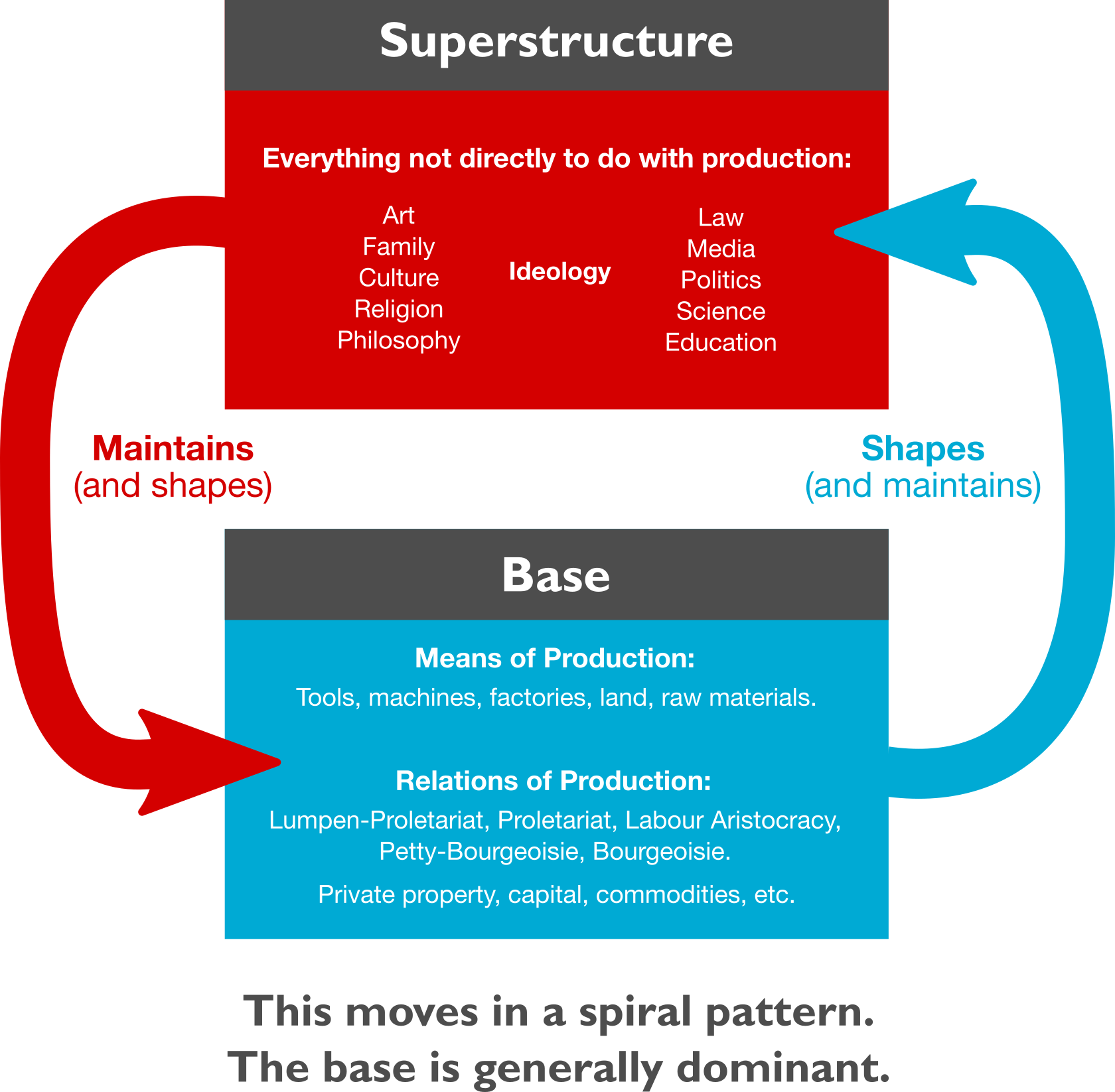More languages
More actions

The base and superstructure metaphor is one of the most easily misunderstood Marxist ideas. In the preface of A Contribution to the Critique of Political Economy, Marx wrote
In the social production which men carry on they enter into definite relations that are indispensable and independent of their will; these relations of production correspond to a definite stage of development of their material powers of production. The sum total of these relations of production constitutes the economic structure of society—the real foundation, on which rise legal and political superstructures and to which correspond definite forms of social consciousness.
The base consists of the sum total of production relations whereas the superstructure contains other social relations that are not directly related to production. In The German Ideology, Marx and Engels wrote
Since we are dealing with the Germans, who are devoid of premises, we must begin by stating the first premise of all human existence and, therefore, of all history, the premise, namely, that men must be in a position to live in order to be able to “make history.” But life involves before everything else eating and drinking, a habitation, clothing and many other things. The first historical act is thus the production of the means to satisfy these needs, the production of material life itself. And indeed this is an historical act, a fundamental condition of all history, which today, as thousands of years ago, must daily and hourly be fulfilled merely in order to sustain human life
The base/superstructure metaphor is meant to convey the basic idea of the paragraph cited above. In all human communities, no matter what form they may take, the necessity to produce has always existed because without production human and social life is impossible. It is a simple law of nature that any community must one way or another produce the necessaries of life. In his letter to Kugelmann in 1868, Marx writes
Every child knows a nation which ceased to work, I will not say for a year, but even for a few weeks, would perish. Every child knows, too, that the masses of products corresponding to the different needs required different and quantitatively determined masses of the total labor of society. [...] No natural laws can be done away with. What can change in historically different circumstances is only the form in which these laws assert themselves.
The primacy of production from the point of historical materialism means that all social formations must be shaped primarily by their process and relations of production. Some critics have accused Marxism of reductionism for its emphasis on production, but this is a false criticism because the Marxist emphasis on production does not mean relations that are not situated within the process of production have no impact on social life but only that relative to production relations, they must have much less influence on social life and social change. Engels in his 1890 letter to Bloch's similar accusations wrote
According to the materialist conception of history, the ultimately determining element in history is the production and reproduction of real life. More than this neither Marx nor I have ever asserted. Hence if somebody twists this into saying that the economic element is the only determining one, he transforms that proposition into a meaningless, abstract, senseless phrase. The economic situation is the basis, but the various elements of the superstructure: political forms of the class struggle and its results, to wit: constitutions established by the victorious class after a successful battle, etc., juridical forms, and then even the reflexes of all these actual struggles in the brains of the participants, political, juristic, philosophical theories, religious views and their further development into systems of dogmas, also exercise their influence upon the course of the historical struggles and in many cases preponderate in determining their form. There is an interaction of all these elements in which, amid all the endless host of accidents ... the economic movement finally asserts itself as necessary.
The reason Marxists emphasise the importance of the base, that is, the sum total of production relations is not because they believe production is the only determining factor of social life. It is rather because in view of the primacy of the need to produce the necessaries of life in any form of community, production relations compared to other relations exert considerably more influence on social life.
